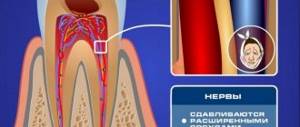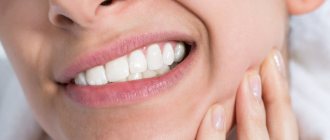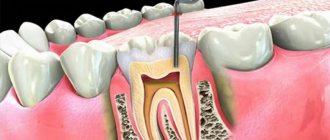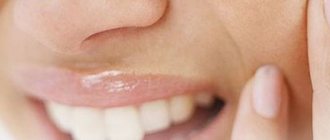Tongue hurts - what this symptom can mean and how to deal with it
The tongue takes an important part in the process of eating and is responsible for human speech. The surface of the organ is covered with a huge number of papillae, which contain tiny receptors - they allow us to enjoy the taste of our favorite foods. Among other things, the tongue is a kind of indicator of the health of the body. Many systemic diseases and disorders in the functioning of internal organs immediately affect his condition, thus signaling a problem. One of these “signals” may be pain, and here the question involuntarily arises of how you can numb the tongue and what needs to be done for this. Read about the possible causes of pain in the organ, as well as ways to eliminate it, further in this article.
How to get rid of tongue pain?
Associated symptoms
Pain on the tip of the tongue is often accompanied by other unpleasant symptoms:
- burning;
- tingling;
- pinching;
- dryness of the tongue and mouth;
- covering the surface of the mucous membrane with a white or yellow coating;
- changes in the physiological structure of the papillae on the organ;
- varicose veins on the organ (a common symptom for older people).
What can cause pain?
There are quite a few factors that provoke pain in the tongue. Therefore, before you try to get rid of unpleasant sensations, you need to understand what caused them. So, more often than usual, the main communication tool begins to hurt in the following situations:
- mechanical damage,
- inflammation of soft tissues,
- allergic manifestations,
- neuralgia,
- blockage of the salivary glands,
- problems in the functioning of internal organs and systems,
- oncology.
Often this symptom becomes an allergic reaction of the body to certain foods or medications. Many also experience soreness and sharp tingling under the tongue after eating acidic foods, citrus fruits, alcohol and smoking cigarettes. A reaction to an allergen can also manifest itself in the form of stomatitis or the spread of a fungal infection.
On a note! When the tip of the tongue or its lateral areas begins to hurt, most often the cause of the problem lies in injury to the organ. This could be an accidental bite, burn, cut or small scratch. In addition, damage can be caused by a chipped tooth, an incorrectly fitted prosthetic structure, a brace system, or a sharp-edged filling.
The most common neuralgic factor that provokes pain in the tongue is glossalgia. The pathological condition develops against the background of disturbances in the functioning of the endocrine system or as a result of experiencing a serious stressful situation. The tongue may become completely or only partially numb, and the patient will experience a sharp tingling and burning sensation. Patients also complain of pain in the lips, dizziness and numbness of the tongue1.
Stress can cause tongue pain
On a note! Mild soreness and numbness of the tongue may be felt after dental treatment under anesthesia, especially after wisdom tooth extraction. How can you alleviate the condition after such an operation? To relieve pain, you can take a painkiller tablet, but if the pain is severe and intensifying, you should definitely see a doctor.
No less often, this symptom indicates problems in the functioning of internal organs and the development of systemic diseases. These include malfunctions of the digestive, cardiovascular and endocrine systems, anemia and even oncological pathologies.
Stroke
In some cases, a numb tongue is the first sign of an acute disruption of the blood supply to the brain. Stroke is considered the second most common cause of death after a heart attack.
If numbness or tingling in your tongue is accompanied by other warning signs, call emergency medical services immediately.
Danger signs:
- slurred, distorted speech;
- loss or confusion of consciousness, delirium;
- weakness, immobility, numbness of half the body;
- urinary or fecal incontinence;
- impaired vision, coordination;
- difficulty breathing with swelling of the face.
Pain at the tip of the organ
To answer the question of how to remove pain in the tip of the tongue, it is necessary to consider the possible causes of the appearance of a symptom in this particular localization. And here are the most common ones:
- damage to the tip: usually the cause of the problem is simply biting this part of the tongue while eating or talking. Too hot food or drink, dentures and braces can also cause injury. This pain subsides on its own over time as the damaged tissue heals. If the problem is in the orthopedic or orthodontic system, sharp edges of the crown or filling, you should contact your dentist to eliminate the irritating factor,
A common cause of pain is damage to the tip of the tongue. - glossalgia: a rather serious pathology in which this particular part of the organ usually hurts, less often the sides. In this case, the patient experiences a strong burning sensation, comparing it with the consequences of a burn. Such a symptom requires immediate contact with a specialist - the disease is long and difficult to treat, therapy is very exhausting for the patient,
- glossitis: an inflammatory disease that often causes pain in the tip of the organ, and the explanation for this lies in its susceptibility to mechanical damage, in particular biting. Through the wound, the infection penetrates the tissue and causes inflammatory processes.
The photo shows glossitis of the tongue
Stomatitis can provoke the symptom, but in this case, usually the entire surface of the organ is covered with small, painful tongues. Allergies may be the cause of the problem.
Raynaud's syndrome
Another cause of discomfort is poor circulation of small vessels. This condition is provoked by cold, severe stress, and vibration. As a result, a spasm occurs that reduces blood flow to the face and limbs. The affected area turns white, then blue. This is primary Raynaud's syndrome and can affect the tongue.
A person feels tingling, numbness or pain in the affected area, then blood flow is restored and everything returns to normal.
Unpleasant symptoms will quickly disappear if you warm up, calm down and relax.
The secondary syndrome is called Raynaud's disease. This is a dangerous health condition that is caused by a compromised immune system or peripheral nerve damage due to diabetes. Raynaud's disease manifests itself with the same symptoms as the syndrome, but has more serious consequences.
Pain in the sublingual area, at the root
How to relieve pain that appears in the far part of the tongue, at its very base? Before answering this question, let’s look at the most common causes of this symptom, and they can be as follows:
- glossalgia: pain is usually localized at the tip, but can sometimes occur at the base,
- allergies: literally any part of an organ can hurt,
- digestive system diseases,
- vitamin deficiency: pain is often accompanied by severe tingling.
This is what glossalgia looks like at the base of the tongue.
Cellulitis and abscess are considered serious prerequisites for the symptom in question. In this case, it is painful for the patient to open and close his mouth, a bad odor occurs, and the intensity of salivation increases. The tongue visibly swells, making it difficult for a person to speak and breathe. This requires urgent medical attention.
About the features of symptoms
Soreness of the tongue on the side is always accompanied by other symptoms, according to which the doctor can make a diagnosis during the first examination of the patient. Inflammation almost always develops in the affected area - it can be seen by such manifestations as:
- redness of the mucous membrane;
- ulcers and erosions;
- sensation ;
- whitish or gray coating;
- the papillae of the tongue are enlarged;
- swelling of the organ around the edges or completely.
In some diseases, dry mouth, increased salivation, swelling of nearby lymph nodes, and an increase in local temperature are observed. If a neurological pathology develops, a person may experience an unexplained numbness of the tongue, difficulty speaking, and a headache.
Pain from the chewing teeth
Discomfort and pain in this part of the tongue most often indicate mechanical injury to soft tissues. Other probable provoking factors include glossalgia, glossitis, allergies and stomatitis. Often the cause of the problem is a deformed denture, which constantly rubs and requires relining or replacement.
“I woke up one night with severe pain in my tongue, and it hurt only on one side. This is what happens when you wait too long to reline your denture. I have a removable one on the lower jaw, it’s been squinting for a long time, but I thought I’d endure it, it’s okay. As a result, my whole mouth became swollen, and then I couldn’t speak normally for a week. A denture is no joke; it needs to be adjusted on time. And then there are wounds in the mouth, and through them the infection penetrates ... "
Lyubov Andreevna K., 56 years old, from correspondence on the woman.ru forum
Pain from the chewing teeth can be caused by various factors.
By the way, the sides of the tongue may begin to hurt due to too frequent smoking. But if no visible causes for this symptom can be found, there is reason to think about neuralgia. In any case, to understand the true source of the problem, you need to make an appointment with a doctor.
Treatment
All of the above diseases of our speech organ have similar symptoms, characterized by plaque, redness, swelling, changes in color, shape and erosion. And only a specialist can determine what kind of disease has affected this organ, after conducting a series of studies. Therefore, based only on the described symptoms, you should never self-medicate, which can significantly worsen the condition and complicate the recovery process.
Usually, ointments (painkillers, antifungals), antiseptic solutions, and wound healing agents are used. For viral diseases, general treatment is added to local treatment.
Diseases of the tongue can indicate to a specialist internal diseases that have not yet discovered themselves. Find out which doctor treats tongue and seek help for any of the above symptoms.
Consultations with a doctor online Taking care of your health is a life priority for everyone.
Communicate with doctors online and receive qualified assistance without leaving your home. Try it Please note! The information on this page is provided for informational purposes only. To prescribe treatment, you must consult a doctor.
Methods for relieving pain at home
Having considered the most common factors that provoke pain in the tongue, we can move on to recommendations on how to quickly remove pain and alleviate the condition. If it is not possible to visit a doctor in the near future, you can relieve an acute symptom using the methods presented below.
Medications
To carry out antiseptic treatment of soft tissues and relieve severe inflammation, it is recommended to rinse the mouth using the following pharmaceutical products:
- "Chlorhexidine" is an antimicrobial drug in the form of a solution. Before the procedure, you must rinse your mouth with boiled water, then rinse for 30 seconds with the addition of a solution. The procedure can be repeated 2-3 times a day,
- “Stomatofit” is a product based on plant components that have antiseptic and anti-inflammatory effects. A teaspoon must be dissolved in 50 ml of warm boiled water and rinse your mouth with the resulting mixture for 2 minutes. You can repeat the procedure 3-4 times a day,
- “Miramistin” is a solution in a jar with a convenient sprayer. Before use, you need to fix the nozzle on the neck of the bottle, then just press the cap and direct the sprayer into your mouth. 4 repetitions a day are enough.
To relieve acute painful pain, you can resort to the help of a pharmaceutical anesthetic, for example, use the drug “Lidocaine” in the form of a spray. Before using any medications, it is better to first consult with a knowledgeable specialist.
Folk remedies
Some traditional medicine remedies will help quickly relieve acute pain and reduce inflammation. Just remember that such prescriptions can only be used with the consent of a doctor. Here are some tried-and-tested recipes:
- decoction of chamomile - pour boiling water over a tablespoon of dried herb and let cool to room temperature. It is recommended to rinse 5-6 times a day, after meals,
- raw potato juice - peel and grate several raw tubers, and then try to squeeze the juice out of them. You can use the mouthwash 2-3 times a day,
- sage decoction - pour boiling water over two tablespoons of dried herb and let it brew for half an hour. After this, pass the liquid through a sieve and use to rinse your mouth 3-4 times a day.
Chamomile decoction is great for rinsing
. Keep in mind that the use of traditional medicine in no case cancels a visit to a specialist. These are only auxiliary measures to relieve acute manifestations of the problem, which only an experienced doctor can solve after diagnosing and identifying its causes.
Which doctor should I contact?
If you experience discomfort in your tongue, it begins to tingle or hurt, be sure to make an appointment with a specialist. In such a situation, you can contact both a dentist and an otolaryngologist. In any case, if necessary, the doctor will redirect you to the right specialist.
Only a specialist can prescribe the correct treatment
You can choose the right course of treatment only if you have an accurate diagnosis. Pain in the tongue is a symptom that is characteristic of many pathological conditions, and may be an echo of a serious systemic disease of the body. Self-medication is simply inappropriate here. Otherwise, you can only aggravate the situation and bring it to very disastrous consequences. If pain appears in the main speech organ, be sure to see a doctor.
- Kazarina L.N. Diseases of the oral mucosa, 2000.
Diagnostics
To determine the diagnosis, it is necessary to undergo the following types of research:
- general and detailed analysis of blood and urine;
- Ultrasound of internal organs;
- secretory function of the stomach;
- contrast x-ray of the stomach;
- CT or MRI – performed for timely detection of oncology;
- synthesis pancreatic hormones
You cannot refuse the examination - continued exposure to provoking factors will lead to a deterioration in the condition of the oral cavity and the spread of the disease to other organs.











